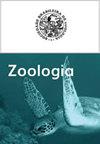Reproductive parameters of the Chestnut-capped Blackbird, Chrysomus ruficapilus (Passeriformes: Icteridae), in a natural wetland from southeastern Brazil
IF 1.8
4区 生物学
Q4 ZOOLOGY
引用次数: 0
Abstract
The Chestnut-capped Blackbird, Chrysomus ruficapilus (Vieillot, 1819), is a common bird species in flooded areas of South America. Data on its reproductive parameters have been reported mainly for rice paddies from Uruguay and southern Brazil, where reproductive phenology might have been influenced by the chronology of agricultural activities. Here we provide reproductive data for a population in a natural marshland from São Paulo state, southeastern Brazil. A total of 45 active nests were monitored between December 2017 and April 2018. Clutch size was 2.8 ± 0.44. Incubation and nestling periods were respectively 11.8 ± 0.39, and 12.3 ± 0.75 days, and overall nesting success was 65%. The reproductive season lasted about five months, which is longer than that observed in rice paddies from southern Brazil. This suggests that the reproductive phenology has been underestimated before. Although clutch sizes were bigger in our study population than that from rice paddies from southern Brazil, nest survival was higher in the artificial habitat, suggesting that the Chestnut-capped Blackbird can obtain benefits from nesting in artificial habitats.巴西东南部天然湿地栗色黑鹂繁殖参数的研究
栗色冠黑鸟,Chrysomus ruficapilus (Vieillot, 1819),是南美洲洪涝地区常见的鸟类。关于其生殖参数的数据主要报告了乌拉圭和巴西南部稻田的数据,这些稻田的生殖物候可能受到农业活动年表的影响。在这里,我们提供了来自巴西东南部圣保罗州的天然沼泽地的一个种群的生殖数据。在2017年12月至2018年4月期间,共监测了45个活跃的巢穴。离合尺寸为2.8±0.44。孵育期为11.8±0.39 d,孵巢期为12.3±0.75 d,总体筑巢成功率为65%。繁殖季节持续了大约5个月,比在巴西南部稻田观察到的要长。这表明生殖物候学以前被低估了。虽然本研究种群的蛋数比巴西南部稻田的蛋数大,但人工栖息地的巢存活率更高,这表明栗帽黑鸟可以从人工栖息地筑巢中获益。
本文章由计算机程序翻译,如有差异,请以英文原文为准。
求助全文
约1分钟内获得全文
求助全文
来源期刊

Zoologia
生物-动物学
自引率
0.00%
发文量
15
期刊介绍:
Zoologia, the scientific journal of the Sociedade Brasileira de Zoologia (SBZ), is an international peer-reviewed, open-access Zoological journal that publishes original research on systematics, evolution, taxonomy, nomenclature, biogeography, morphology, physiology, biology, ecology, symbiosis, conservation, behavior, genetics and allied fields. The journal, formerly known as Revista Brasileira de Zoologia, publishes original articles authored by both members and non-members of the Society. The manuscripts should be written exclusively in English.
 求助内容:
求助内容: 应助结果提醒方式:
应助结果提醒方式:


